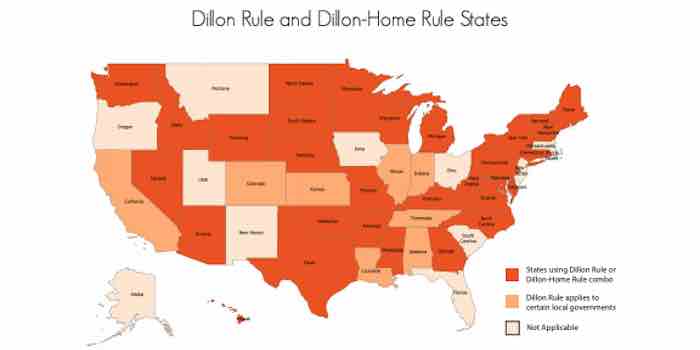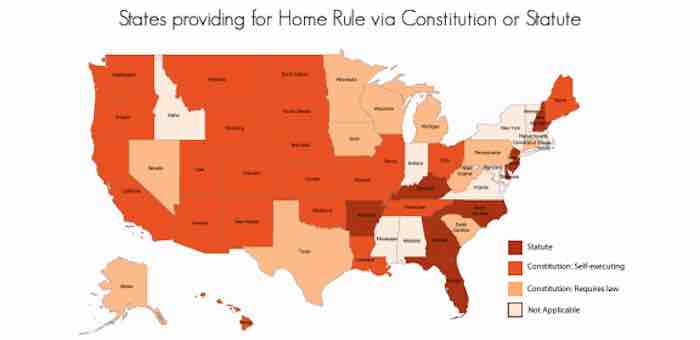Federal overreach: What about Home Rule?
Who better to manage a county’s natural resources, economy and living conditions than the locals who know their neighbors, can best protect their environment, and understand the rights and needs of their community?
Canada Free Press
Things are heating up, and, no, that’s not a reference to the three-digit temperature readings across the country this summer. It’s acknowledging the rising tempers of citizens being forced to endure regulation upon regulation coming down from the Biden administration restricting access to everything from public lands to gas stoves, air conditioning and even light bulbs.
The looming question is what to do about it when Congress is dragging its feet despite the barrage of “investigations” and states refusing to step-in with their constitutional authority to “throw the bums out” – the bums being federal agencies.
In a limited sense, counties have attempted to institute a version of home rule that has taken the form of decreeing “sanctuary” localities, be they municipalities or counties, and have come from two opposite creeds.
Application of home rule is determined by each state’s constitution
On the one side, local governments have declared themselves a sanctuary for illegal activity, most often protecting illegal aliens from being deported or charged with crimes that end up being applied only to legal citizens. On the other hand, counties have declared themselves protectorates for Second Amendment rights to bear arms.
The difference between the two is that local governments haven’t jurisdiction to absolve illegal entrants to the country (migrants, e.g. illegal aliens) of their federal crimes. Counties do, however, have the power to enforce constitutional rights in the face of federal attempts to undermine those rights, such as the First and Second Amendments which federal agencies pushed to deny in the face of Covid and the administration’s engineered collapse of the border.
It must be understood that the application of home rule is determined by each state’s constitution, whether it is supported by statute or inherent in the state or federal constitution itself.
Here are some basic concepts to be considered regarding home rule:
Counties and States may intervene for citizens when a foreign organization tries to exercise control within local jurisdiction. In fact, federal government is essentially a foreign organization in the confines of the sovereign state regarding Ninth and Tenth Amendments.
“States have Home Rule through the Federal Constitution. Essentially the 10th Amendment is “Home Rule” for State governments, and since it and the 9th Amendment set forth:
Amendment IX “The enumeration in the Constitution, of certain rights, shall not be construed to deny or disparage others retained by the people. And.…
Amendment X “The powers not delegated to the United States by the Constitution, nor prohibited by it to the States, are reserved to the States respectively, or to the people.” (https://www.archives.gov/founding-docs/bill-of-rights-transcript#toc-amendment-ix) Toddy Littman, legal researcher.
“Permit me to mention one great principle, the vital principle I may well call it, which diffuses animation and vigor through all the others. The principle I mean is this, that the supreme or sovereign power of the society resides in the citizens at large; and that, therefore, they always retain the right of abolishing, altering, or amending their constitution, at whatever time, and in whatever manner, they shall deem expedient.” James Wilson, Founding Father, Lectures on Law: Volume 1 Chapter 1 page 17.
“The purpose of home rule is to allow for local solutions to local issues and problems. A municipality with home rule status can exercise any power and perform any function unless it is specifically prohibited from doing so by state law.”
Home Rule–whether the Dillon Rule or statutorily or constitutionally addressed–or not at all
States have either adopted a method for implementation of home rule–whether the Dillon Rule or statutorily or constitutionally addressed–or not at all, leaving the interpretation up to what is inferred by the United States Constitution. This brief publication offers an overview and a map of where individual states stand on the issue, particularly regarding Nebraska:
Interestingly, the leftist state of Oregon has the strongest support for local home rule
Interestingly, the leftist state of Oregon has the strongest support for local home rule, supporting the availability of implementation both statutorily or constitutionally. As of 2005, the date of this paper, 36 counties had adopted home rule charters.
In that case, what is holding back counties from taking action to shutdown not only federal encroachment on everyday lives of citizens but state meddling as well? It is the election of local officials–municipal and county–that are political creatures rather than actual representatives of the citizenry. In too many cases, ties to political party powerbrokers has more influence over candidates than serving the needs of local constituents.
The fault in electing city council members or county commissioners is directly related to campaign funding. It is much the reason there is a nationwide effort to retake Republican party control through electing precinct committee members who are dedicated to retaining (or re-instating, at this juncture in history) the constitutional republic the Founders established.
Biblically speaking, the root of all evil is the love of money, not money itself. What has been witnessed in the corruption of virtually every governing body within the country is the application of money to campaigns but also through federal programs.
In rural Oregon, where home rule has the greatest possibility of working to benefit locals, it was noted by a rancher who has studied home rule that as long as agriculture entrepreneurs are willing to continue receiving federal funding for equipment, drought insurance, non-production of crops, etc., nothing will change.
Federal agencies continue to expand requirements on natural resource operations to the point that mining, ranching, farming and timber industries are literally bankrupted because they can’t accommodate unnecessary regulations
In his words, “Like Nancy Reagan, “Just Say No” to the feds. Are ranchers willing to halt the money train of subsidies–agricultural welfare–willing to get off at the next station? …There’s no secret switch you have to flip,” you just have to do it. “It’s a money issue.”
“It’s a money issue” is worth repeating. Like everything else in modern American society, each aspect of life has been connected to federal dollars, whether it’s rural counties (where USFS retains more land than private owners) that receive PILTfunding, or ag operations being pressured to federally finance things like “approved” sprinkler systems for crops, flood and, as mentioned above, drought insurance.
Federal agencies continue to expand requirements on natural resource operations to the point that mining, ranching, farming and timber industries are literally bankrupted because they can’t accommodate unnecessary regulations. Administrative agencies have gone so far to limit most service or appliance merchants, hamstringing operations that they struggle to keep their doors open.
Where counties have virtually “lost” land to federal agencies by way of executive order and the simple publishing of land grabs in the Federal Register rather than the lawful actions of state legislatures and Congress, home rule should be entertained to enforce the Ninth and Tenth Amendments and legally remove federal influences. That means lands that have been arbitrarily placed under the jurisdiction of executive departments and subject agencies by fiat–USDA, USFS, USFW, BLM, BIA, et al which policies harm local citizens’ health, welfare and livelihoods –county jurisdiction may be re-established via home rule.
Having reached this point of no return because neither state or federal authorities will take meaningful action, it may be time for counties to take a hard look at home rule. There is a caveat to getting a home rule operation that actually serves the local community according to Kody Justus, the Oregon rancher quoted earlier, “the beauty of Home Rule is if you have circuit judges, sheriff and county commissioners on the same page–all elected by the people–the people will be served.”
Root out looters in office and replace them with citizens willing to serve their community
And, if not, state and federal interference in local affairs won’t be stopped.
Sheriff Richard Mack, founder of Constitutional Sheriffs and Peace Officers Association, noting he had not worked in a county where home rule had been established, did say this, “I do know that Home Rule charters are not the same in all places. If a Home Rule though, attempted to control or limit the elected sheriff in any manner, then doing something like that would be illegal. The sheriff answers to the people, not the county commission or a home rule charter.”
The answer in counties where citizens recognize their rights have been “denied” or “disparaged,” or their powers haven’t been “delegated to the United States by the Constitution” is to root out looters in office and replace them with citizens willing to serve their community. Then can home rule be instituted according to the individual state’s legislation, constitution or, going back to the beginning, the U.S. Constitution.
The tipping point is government violation of citizens’ basic rights to supply for their family needs and care down to performing everyday household chores. The unconstitutional imposition of executive restrictions signals it’s time to initiate local authority and send federal management back to its only sphere of influence–the ten square miles of Washington, D.C., certain roads, buildings and military installations as defined in Article I Section 8 of the Constitution of the United States of America.
Who better to manage a county’s natural resources, economy and living conditions than the locals who know their neighbors, can best protect their environment, and understand the rights and needs of their community?
••••••••
Note: For those wishing to further investigate Home Rule, here are some websites to check. Searching individual state constitutions and statutory codes for references to Home Rule is the next step:
- https://ballotpedia.org/Home_rule
- https://content.next.westlaw.com/practical-law/document/I4d6d013117a511e698dc8b09b4f043e0/Home-Rule?transitionType=Default&contextData=%28sc.Default%29&firstPage=true&viewType=FullText
- https://www.klc.org/news/475/What_is_home_rule
- https://nebraskalegislature.gov/pdf/reports/research/snapshot_localgov_2020.pdf
- https://oregoncounties.org/news/publications/home-rule/ – this examines the history of Home Rule
- https://dced.pa.gov/download/Home%20Rule%20PA/?wpdmdl=57752
- https://whyy.org/articles/what-is-home-rule/
- https://www.iml.org/homerule
- https://definitions.uslegal.com/h/home-rule/
- https://thelibertybellenc.com/blog/the-constitutional-role-of-the-sheriff/
See more from Canada Free Press here
Subscribe to RANGE magazine
Call 1-800-RANGE-4-U
You may also like
-
Arizona rancher sues to stop million-acre national monument
-
VDH: How to Destroy the American Legal System
-
Colorado conservation group sues wildlife officials for skirting NEPA to get wolves into the state
-
Polis adds another radical activist to Colorado Parks & Wildlife Commission
-
Public Land Expansion Syndrome in the West




